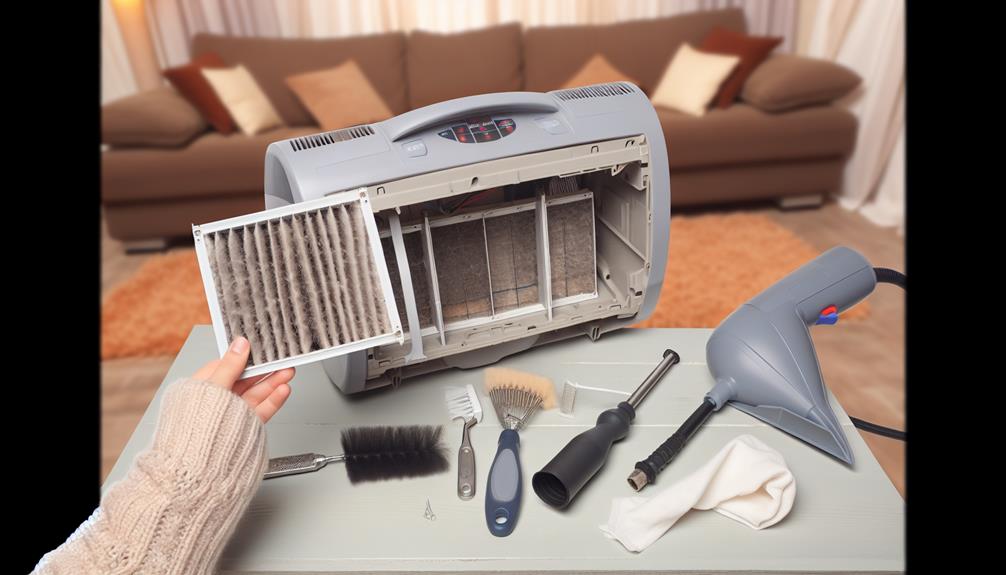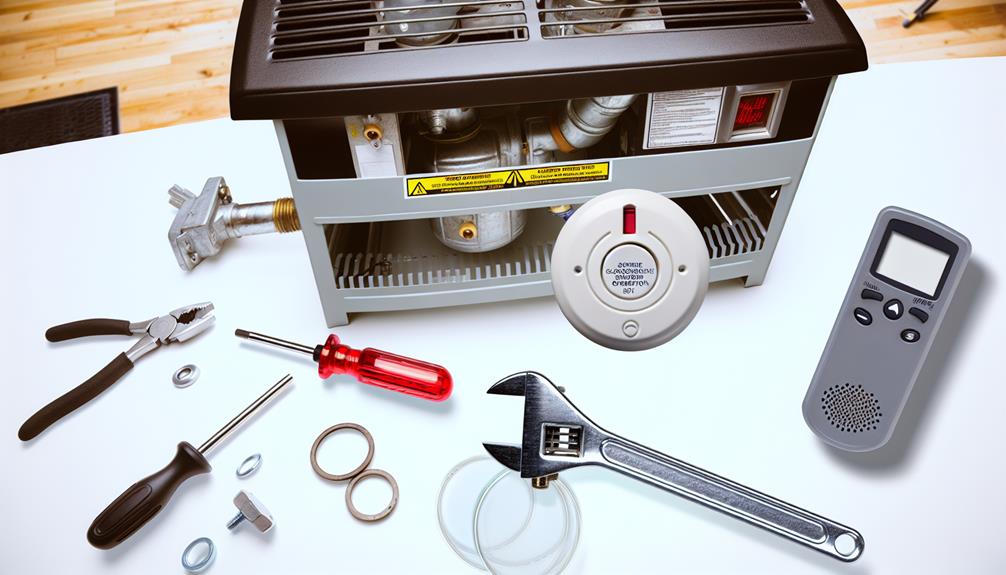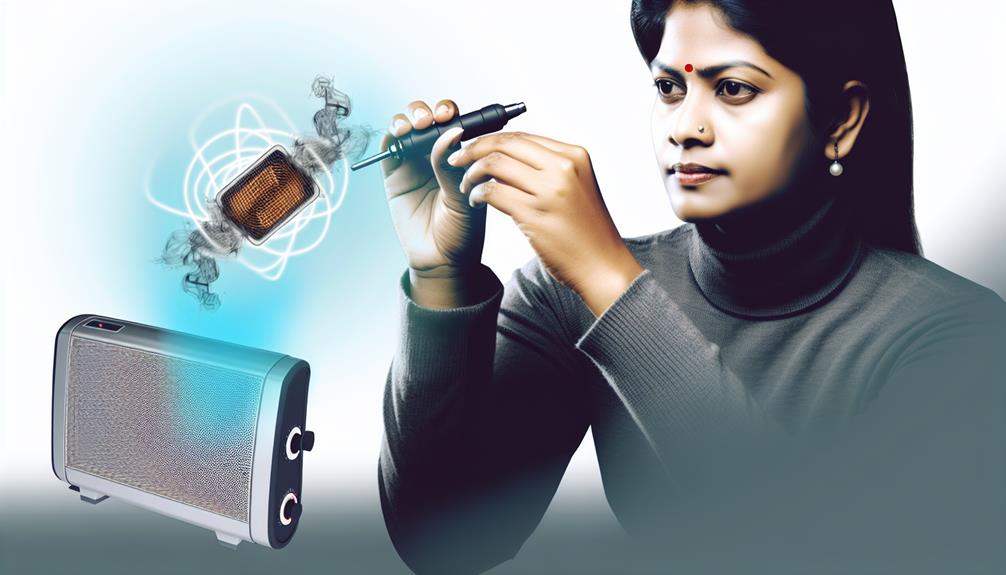While you rely on your portable heater to keep your space cozy, you're likely unaware that improper balancing can lead to uneven heating and unnecessary strain on the unit. As a professional in the field, I recommend you don't overlook the importance of routine checks and balancing of your heating device. Not only does this practice extend the life of your heater, but it also ensures it operates at peak efficiency—saving you money in the long run. Think about the last time you inspected the filters or checked if the thermostat was accurate; these seemingly small tasks can have a substantial impact on your comfort and safety. Now, imagine discovering simple, yet vital tips that could prevent that odd noise your heater makes or the peculiar smell that sometimes wafts through the room—indicators that there's more to your heater's upkeep than meets the eye.
Key Takeaways
- Craft a maintenance schedule tailored to your heater's specific needs, age, and usage patterns.
- Regularly inspect and replace/clean filters to maintain steady airflow.
- Calibrate the thermostat periodically for accurate temperature control.
- Regularly inspect electrical components for signs of damage and ensure proper connections.
Understanding Portable Heater Types
To ensure your portable heater operates efficiently and safely, it's essential to identify whether it's powered by electricity, gas, or oil, as each type has unique maintenance requirements. Electric space heaters convert electrical energy directly into heat through their heating elements. These units typically require less maintenance compared to gas or oil heaters. However, it's important to regularly inspect the heating elements and electrical cords for any signs of wear or damage.
Gas space heaters utilize natural gas or propane to create warmth, which means they involve combustion and, therefore, need adequate ventilation to prevent the buildup of harmful gases. You must check the condition of the burner and the state of the venting systems to ensure they're functioning properly. Oil heaters, on the other hand, rely on heating oil that is heated and circulated to radiate warmth. These heaters necessitate monitoring the oil levels and ensuring that the oil filter and burner are clean and in good working order.
No matter the type, all Space Heaters demand routine maintenance to perform optimally. This includes thorough cleaning to prevent dust accumulation, which can impede airflow and efficiency. Regular checks and balancing of various types of portable heaters are crucial for your comfort and safety.
Establishing a Maintenance Routine
Crafting a maintenance schedule tailored to your heater's specific needs, including its age, usage patterns, and the manufacturer's guidelines, is critical for optimal performance and longevity. Heater maintenance becomes a manageable task when you regularly mark your calendar for specific maintenance activities. This balance of personal oversight and professional maintenance ensures your unit operates efficiently.
Begin with regular inspections of filters, and replace or clean them as necessary to maintain steady airflow. It's not just about cleanliness; it's about ensuring your portable heater's functionality and energy efficiency. Don't overlook vents and ducts—keeping them clear is vital for consistent heat distribution.
To prevent discrepancies in heating, calibrate your thermostat periodically. Accurate temperature control is not only a comfort issue but also an indicator of your heater's health. If you're not confident in handling these tasks, professional maintenance is always a reliable option.
Cleaning and Filter Maintenance

Regularly checking your portable heater's air filters each month and replacing them every three months is crucial for maintaining air quality and system efficiency. This regular maintenance is a key step in ensuring your heater operates at peak performance, which can contribute to energy efficiency and prolong the life of your device.
Here are some detailed steps to follow:
- Inspecting Air Filters: Look for buildup of dust and debris. If the air filter appears dirty, it's time for a clean or replacement.
- Cleaning Vents and Ducts: Remove any obstructions to maintain proper airflow, which is vital for your heater's operation.
- Replacing Oil Filters: For oil-fired units, change the oil filter annually to prevent clogging and ensure efficient heating.
- Optimizing Airflow: Regularly clean around the heater's intake and exhaust areas to prevent airflow restrictions.
Thermostat Accuracy Checks
You'll need to verify the calibration of your heater's thermostat regularly to maintain its optimal performance. Assess the temperature readings twice annually, during spring and fall, to catch any discrepancies. If you notice any issues, troubleshoot the thermostat promptly to prevent inefficiencies.
Verify Thermostat Calibration
To ensure your portable heater operates at peak efficiency, it's essential to check and calibrate the thermostat accurately and periodically. An improperly calibrated thermostat can lead to inefficiencies in your heating system, hampering optimal performance. Here are some Maintenance Tips to verify the thermostat calibration:
- Check the thermostat's accuracy by comparing its readings to a reliable thermometer.
- Adjust the thermostat dial carefully if discrepancies are found.
- Consult a professional if you're unsure about the calibration process or encounter persistent issues.
- Perform routine checks, as periodic calibration can prevent future inaccuracies.
Assess Temperature Readings
After verifying and adjusting your portable heater's thermostat calibration, it's crucial to assess the temperature readings for consistency and accuracy to maintain your unit's efficiency. Minor deviations can impact not just the heating but also your indoor air quality. If your heater's system isn't functioning at optimal levels, it could be due to inaccurate temperature readings.
| Season | Action | Purpose |
|---|---|---|
| Spring | Check | Ensure accurate temperature control before heavy usage |
| Fall | Verify | Prep the heaters for efficient winter operation |
| As Needed | Troubleshoot | Address Unusual Noises or performance issues |
Troubleshoot Thermostat Issues
Ensuring that your portable heater's thermostat functions accurately is crucial for maintaining optimal performance and energy efficiency. To troubleshoot thermostat issues effectively:
- Check the thermostat twice a year, ideally in spring and fall, to prevent inefficient heating.
- Confirm that the furnace kicks in and runs for a substantial period; if it switches off too soon, it might be short cycling.
- Always set the thermostat to the correct mode for the season—cool or heat.
- Recognize that a properly set thermostat not only ensures comfort but also saves money.
If you notice irregular performance or signs of wear and tear, don't hesitate to call a professional. Regular thermostat checks are an integral part of your HVAC system's maintenance routine.
Inspecting Electrical Components
Begin your maintenance routine by examining the portable heater's electrical components for signs of damage, such as frayed wires or loose connections, to prevent safety hazards. Inspecting electrical components is crucial, particularly when it comes to home heating appliances like gas heaters, which can pose significant risks if not properly maintained.
| Inspection Task | What to Look For |
|---|---|
| Wiring and Plugs | Signs of damage, wear, or fraying |
| Connections | Loose connections that need securing |
| Power Cord | Cuts, fraying, or exposed wires |
| Switches and Controls | Proper operation and functionality |
Check that the wiring, plugs, and sockets are free of damage. If you spot any wear, address it immediately. A compromised power cord is a fire risk; any cuts or fraying warrant prompt replacement. Confirm that all connections are tight and secure to prevent electrical mishaps.
Test the switches and controls to verify they are functioning as intended. This ensures your heater operates efficiently and safely. Always ensure that electrical components meet the manufacturer's specifications and adhere to safety standards. Lastly, remember to regularly test your carbon monoxide detectors and smoke alarms, as they are your first line of defense in detecting dangers from malfunctioning home heating systems.
Gas Heater Safety Precautions

When operating your gas heater, it's crucial to maintain adequate ventilation to counteract carbon monoxide accumulation. You must adhere to regular leak detection practices to swiftly identify and address any gas leaks. Furthermore, establish a meticulous maintenance schedule to ensure your heater's safety and longevity.
Ventilation Requirements
To prevent the dangerous accumulation of carbon monoxide, always ensure your gas heater has adequate ventilation. Here's what you need to keep in mind regarding ventilation requirements:
- Maintain a clear space around the heater, keeping it away from combustible materials.
- Regularly inspect and clear vents to prevent blockages that can restrict airflow.
- Adhere to the manufacturer's guidelines for optimal placement and ventilation to ensure safety in enclosed spaces.
- Install carbon monoxide detectors nearby to alert you of any hazardous gas levels.
Leak Detection Practices
Having established the importance of ventilation to mitigate carbon monoxide risks, let's now focus on leak detection practices essential for gas heater safety. You'll want to perform these regularly to ensure your heater's safety. If you suspect a leak, immediately turn off the gas supply and reach out to professional Plumbing Services.
Here's a concise table outlining key leak detection steps:
| Action Item | Description |
|---|---|
| Utilize a Gas Leak Detector | Identify leaks around the heater and gas lines. |
| Inspect Gas Connections and Fittings | Check for wear or damage; tighten if necessary. |
| Follow Manufacturer's Recommendations | Adhere to specific leak detection practices advised. |
| Turn Off Gas Supply if Leak Is Suspected | Prevent potential hazards by cutting off natural gas flow. |
| Contact Professional Services | If a leak is detected, the heater may need expert attention. |
Maintenance Scheduling Importance
Regularly scheduled maintenance is a cornerstone of gas heater safety, ensuring efficient operation and mitigating risks associated with improper use. Recognizing the maintenance scheduling importance can not only keep your home running smoothly but also contribute to lower heating and energy costs. Here's what you need to focus on:
- Establish a consistent schedule for inspections based on the manufacturer's recommendations and your usage patterns.
- Monitor and replace filters regularly to avoid dust and allergens circulating in your air.
- Seek professional assessments to identify and rectify any safety hazards early.
- Maintain indoor air quality by ensuring your gas heater is not contributing to indoor pollution.
Adhering to these steps will help to maintain a safe and warm environment for your family.
Addressing Noise and Smell Issues

When your portable heater starts emitting strange noises or unpleasant odors, it's crucial to first inspect for any loose parts or blockages that could be causing these issues. Unusual sounds can stem from vibrating panels or components that have loosened over time. Tighten these parts to see if the noises subside. If you're confronted with persistent smells, it's a sign you need to address the cleanliness of your heater.
A buildup of dust or debris not only leads to unpleasant odors but can also contribute to higher energy bills as your heater works harder to warm your home. In cold weather, a well-maintained heater is essential for both efficiency and comfort. Below is a table with Tips to Keep your portable heater in optimal condition:
| Issue Type | Possible Cause | Immediate Action |
|---|---|---|
| Noise | Loose parts | Tighten screws |
| Noise | Blockages | Remove obstruction |
| Odor | Dust buildup | Clean internals |
| Odor | Mold presence | Deep clean/repair |
| General | Wear and tear | Consult manual |
Always refer to the manufacturer's manual for troubleshooting specific to your model. If these steps don't resolve the noise or smell, seek professional assistance to avoid long-term damage or escalating energy costs.
Seasonal Storage Practices
Before you tuck your portable heater away for the season, make sure to unplug it and let it cool completely to eliminate any risk of fire. Proper seasonal storage practices are not just about clearing space; they're an effective way to keep your heater in top condition, saving energy and money in the long run. Here's what you need to do:
- Clean the heater thoroughly, paying special attention to the air intake and exhaust areas. This prevents dust from settling and ensures your heater remains effective when you need it again.
- Store your heater in a dry, well-ventilated space. Moisture can be detrimental, causing corrosion or electrical issues.
- Keep the heater away from windows and doors or any area where it might be exposed to dampness or drastic temperature changes.
- If your heater has a filter, remove and clean it, or replace it if necessary. This will ensure that when you bring your heater out for the next cold season, it will be ready to function efficiently without any hitches.
Frequently Asked Questions
What Is the Checklist for a Portable Heater?
Like a detective on a case, you're checking your portable heater's vitals. Start by ensuring proper heater placement—solid, flat, and fire-resistant. Watch out for dust accumulation, which can be a silent foe. Examine the cord condition for any wear and tear. Test the thermostat functionality to maintain a steady, cozy temperature. Lastly, heed any warning signs of damage; they're like red flags in a sea of safety. Stay vigilant and warm!
How Do You Maintain a Portable Heater?
To maintain your portable heater, first ensure correct heater placement away from flammable materials. Routinely remove dust from vents and surfaces. Examine the cord for damage and practice careful cord care. Test the thermostat regularly for accurate readings. Lastly, review your usage habits to prevent overworking the unit, extending its lifespan. By following these steps, you'll keep your heater running efficiently and safely.
What Are the Two Safety Measures for Portable Heaters?
You should always ensure your portable heater has overheat protection and a tip-over switch. These safety measures prevent fires if it overheats or falls. Keep it away from flammable objects, and follow ventilation requirements to avoid dangerous fumes. Additionally, opting for heaters with childproof features adds an extra layer of safety, protecting kids from potential harm. Never underestimate the importance of these precautions to maintain a safe and warm environment.
How Often Should a Space Heater Inspected and Serviced?
You should have your space heater inspected and serviced by a professional annually to extend its lifespan. Regular inspection frequency can prevent safety hazards, ensure warranty validation, and keep you informed about recall alerts. Professional servicing is essential not just for safety but also to maintain the heater's efficiency. Don't skip these checks; they're crucial for the longevity and safe operation of your heating appliance.
